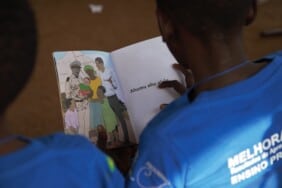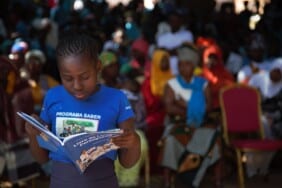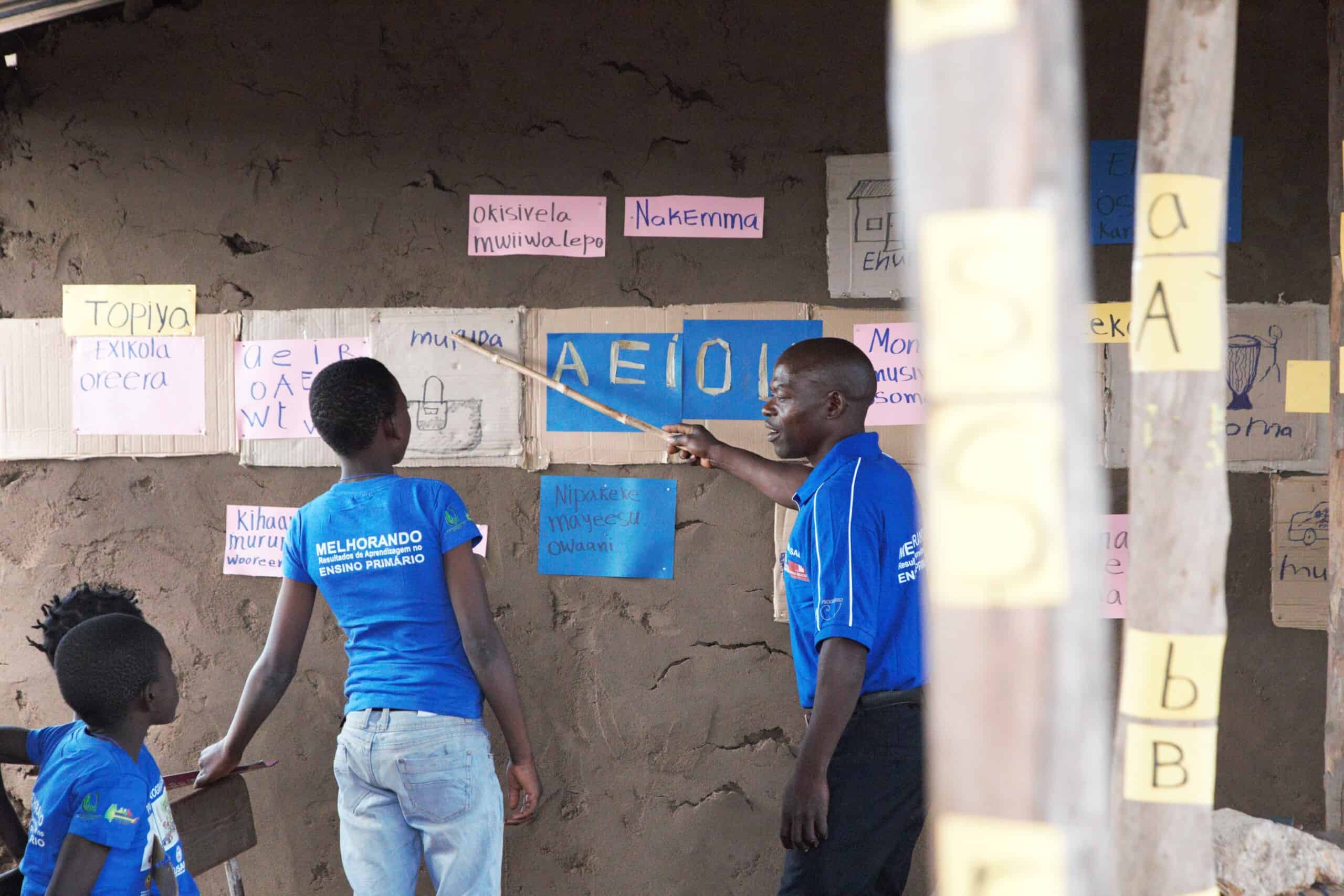[ad_1]
A SABER studying membership facilitator leads studying observe of their native language.
Mozambique’s schooling panorama – progress and lasting challenges
Mozambique’ sturdy funding in schooling – round 19% of complete authorities expenditure between 2008 and 2018 – has resulted in expanded entry to decrease and higher main faculties for younger folks throughout the nation. Nonetheless, regardless of enhancements in class enrollment, pupil retention and studying outcomes stay low [1]. The Ministry of Training and Human Growth (MINEDH) stories that lower than half of the inhabitants full main college, and of those that do end, solely 8 % transition to secondary college. Amongst main college graduates, almost two-thirds depart the system with out fundamental studying, writing, and math expertise. The 2013 nationwide studying evaluation discovered that solely 6.3 % of Grade 3 college students had attained fundamental studying competencies. Mozambique’s total literacy charge is 63 %, with feminine literacy (54 %) lagging far behind that of males (74 %) [2].
The Mozambican inhabitants speaks greater than 40 indigenous languages, with roughly 85 % talking Emakhuwa, Echuwabo, and/or Elomwe as mom tongues whereas fewer than 3% converse Portuguese as a primary language at house.
As well as, a 2018 World Financial institution survey confirmed that solely 3 % of assessed main college lecturers mastered minimal data ranges in arithmetic and fewer than 1% in Portuguese language [3]. A compounding barrier to high quality schooling in Mozambique is excessive absenteeism amongst lecturers (45%), and college administrators (44%) [4], whereas college students are solely in class for 61% of the time.
Is bilingual schooling the panacea?


A pupil practices studying in her first language with a e-book developed by SABER.
There may be common assist for bilingual schooling in Mozambique, notably in rural areas [5]. Bilingual schooling is seen as an incredible achievement within the historical past of Mozambique to advertise the worth of nationwide languages, scale back dropout and repetition charges, and enhance educational success [6].
Mozambique’s first expertise with bilingual schooling was the Authorities, UNESCO, and World Financial institution funded Projecto de Escolarização Bilingue em Moçambique (Bilingual Education Challenge in Mozambique, PEBIMO) between 1993 and 1997. In 2003, a second bilingual schooling pilot initiative was launched by the Authorities of Mozambique and carried out primarily by the Instituto Nacional do Desenvolvimento da Educação (Nationwide Institute for Academic Growth, INDE), Eduardo Mondlane College, and two Mozambican NGOs: Progresso and Unidade de Desenvolvimento da Educação Básica (Primary Training Growth Unit, UDEBA). Qualitative and quantitative evaluations of the 2 bilingual education schemes reported optimistic outcomes, with college students benefitting considerably from using mom tongue within the classroom [7].
This gives proof that bilingual schooling has the power to enhance the standard of schooling in Mozambique and enhance energetic participation and confidence within the classroom for main college college students. Moreover, per MINEDH, 90 % of Mozambican youngsters start main college with out figuring out the Portuguese language. Subsequently, the enlargement of bilingual schooling in Mozambique presents a chance MINEDH faces challenges within the roll out of bilingual schooling as it’s expensive to develop, print, and distribute instructing and studying supplies in all native languages of Mozambique. One other problem are the prices and capability wanted to prepare high quality coaching for instructor and college administrators on the pedagogy, linguistics, and administration of bilingual schooling and the next instructor allocation and supervision.
With funding from the US Company for Worldwide Growth (USAID), World Training has labored to enhance schooling and studying outcomes in Mozambique since 2012. We’ve supported MINEDH to handle these challenges by early grade literacy and numeracy interventions in monolingual and bilingual schooling. In its Bilingual Enlargement Technique (2020-2029), the Authorities of Mozambique has made a renewed dedication to enhancing early grade literacy outcomes by increasing bilingual schooling. Presently, Mozambique has a complete of 13,250 energetic main faculties, with over providing bilingual education schemes.
SABER – Bettering Studying Outcomes in Major Training


A pupil demonstrates her studying expertise in Portuguese.
The USAID-funded Improved Studying Outcomes in Major Training (SABER) program represents a continuation of USAID’s bilingual schooling funding in Mozambique and World Training’s dedication to enhancing schooling and studying outcomes within the nation. Carried out in collaboration with MINEDH and native companions (Associação Progresso, MEPT, NANA, and UATAF), SABER seeks to enhance the life-long potential of Mozambican youngsters by increasing bilingual schooling and strengthening the nationwide schooling system as an entire.
As the most important program supporting bilingual schooling in Mozambique, SABER goals to reveal a sustainable mannequin for the enlargement of bilingual schooling that improves pupil studying and which MINEDH can undertake for additional enlargement all through the nation. SABER builds sustainability in from the beginning by collectively growing, planning, and implementing actions with MINEDH, and native companions to strengthen schooling insurance policies, college administration, instructing practices, evaluation instruments, and methods to enhance college attendance.
SABER outcomes to this point
SABER will work throughout 50 districts in Cabo Delgado, Nampula, Niassa, and Zambezia provinces, reaching over 2,249,080 younger learners, 4,165 main faculties, and 27,813 lecturers over the 5-year lifetime of this system. This system works in grade 1-3 (first cycle) and grade 4-6 (second cycle). An emphasis within the second cycle lies on efficient transition of L1 literacy and numeracy expertise to Portuguese (L2). Along with MINEDH we design the pedagogical routines, supplies, and coaching approaches to develop increased literacy and numeracy expertise of the scholars
By means of SABER, USAID, MINEDH, World Training, and nationwide companions are working collectively to unleash the transformative potential of bilingual schooling to enhance studying outcomes in Mozambique.
_______________________________________________________________________
[1] Highlight on Primary Training Completion and Foundational Studying in Mozambique, UNESCO, 2023.
[2] https://information.worldbank.org/indicator/SE.ADT.LITR.MA.ZS?places=MZ
[3] Training Service Supply in Mozambique; A second Spherical of the SDI Survey, Bassi,M et al, 2019
[4] Training within the New Nation Programme 2017-2020, UNICEF, 2016
[5] Chimbutane, Feliciano 2011. Rethinking bilingual schooling in postcolonial contexts.
[6] Henriksen, Sarita Monjane 202. Reflections on the Language Training Challenge in Mozambique
[7] Benson, Carolyn J. 2010. The Major Bilingual Training Experiment in Mozambique, 1993 to 1997
[ad_2]

